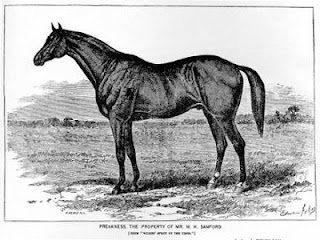Wayne is well known for mall shopping and sprawling suburbia, and the casual visitor would be excused for thinking that maybe some mid-20th century developer had borrowed the race name to give the area some cachet. You know, "Racetrack Estates at Preakness," or some nonsense like that. I have to admit I figured as much the first time I drove through and saw so many businesses using the label. It took some research to discover that the name, indeed, predates the both the race and European settlement in the area.
Preakness Stables was established in 1865 by Massachusetts businessman Milton Sandford, who'd made a fortune as a defense contractor during the Civil War. Like many well-heeled gentlemen, he used his riches to join the racing set, purchasing substantial acreage at what's now the corner of Valley Road and Preakness Avenue. Convenient to his New York offices and a recently built racetrack in Paterson, the land soon was the home of stables, a blacksmith shop and a three-quarter mile track. Sandford borrowed the Lenape name for the community, which has alternately been stated as "Proquales" (quail woods) or "Parekuis" (young buck), depending on the source.
 Sandford also called one of his thoroughbreds Preakness, though the horse had been born elsewhere. Perhaps he was looking to build awareness of his new venture; if so his strategy was a good one. The four-legged Preakness made a stunning debut, winning the inaugural run of the Dinner Party Stakes at Pimlico in 1870. Now known as the Dixie Stakes, the race was, at the time, among the richest events of its kind in horse racing. Preakness went on to an impressive career, racing until the age of eight.
Sandford also called one of his thoroughbreds Preakness, though the horse had been born elsewhere. Perhaps he was looking to build awareness of his new venture; if so his strategy was a good one. The four-legged Preakness made a stunning debut, winning the inaugural run of the Dinner Party Stakes at Pimlico in 1870. Now known as the Dixie Stakes, the race was, at the time, among the richest events of its kind in horse racing. Preakness went on to an impressive career, racing until the age of eight.To honor the winner of its first race, the Pimlico track inaugurated the Preakness Stakes, with the first running in 1873. Interestingly, if you check out the race website, you'll find plenty of history about Pimlico, but nothing about the origin of the race name. If you happen to watch the race this Saturday, let me know if there's any mention.
Oh, and according to Wayne historians, all those sportscasters have been pronouncing the name wrong. Rather than "preek-ness," it's "preak-ness," with the first syllable rhyming with "brake."
No comments:
Post a Comment
Note: Only a member of this blog may post a comment.